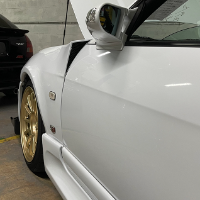Test Pipes And Downpipes?
Announcements
-
Similar Content
-
Latest Posts
-
I'd say it's a fair bet that the feed and return fluid lines will be in different enough spots that you would need to come up with a way to cut the originals short and adapt with new hard line adaption or braided teflon hoses or somesuch. But really, you have the car, you have the photos of the DMAX rack - you should be able to go out there and see for yourself whether they're in the same or different spots.
-
I've been doing some looking around and honestly was just considering throwing a new rack at it. I saw that the dmax silvia rack bolts up into the 33 with the silvia bushings but not sure if the high pressure lines will sit in the correct spot. I believe other version of the 33 rack are the same/similar to the racks that can be opened up without as much fuss so I assume the dmax rack would fit but any ideas?
-
I've never played with one, but I would expect that you are correct. That slot looks like it is intended to be used to unscrew the end, and the flats on the body would be better than grabbing it around the round bit with a pipe wrench. So, yeah, probably unscrews. You'll probably have to make a tool to drive in that slot.
-
A bit late but A disk S13P fit over stock R32 GTR brakes, usually A disk front, O disk rear works.
-
Or, the height of the release bearing is not correct for your combo. Start with the bleeding and checking the slave moves throughout its range when you press the pedal (2 person required), but it is possible for the height to be internally wrong too (box back off to measure.
-



Recommended Posts
Create an account or sign in to comment
You need to be a member in order to leave a comment
Create an account
Sign up for a new account in our community. It's easy!
Register a new accountSign in
Already have an account? Sign in here.
Sign In Now